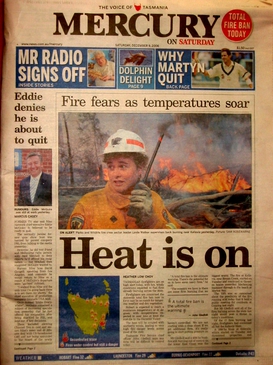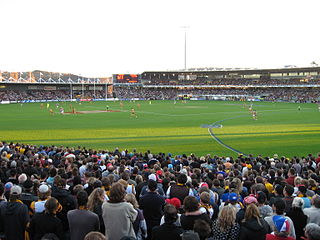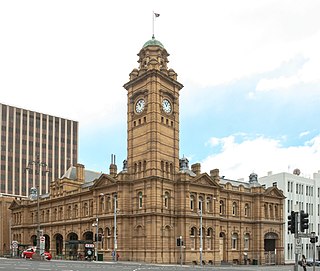Related Research Articles

Burnie is a port city on the north-west coast of Tasmania, Australia. When founded in 1827, it was named Emu Bay, being renamed after William Burnie, a director of the Van Diemen's Land Company, in the early 1840s.

TheMercury is a daily newspaper, published in Hobart, Tasmania, Australia, by Davies Brothers Pty Ltd, a subsidiary of News Corp Australia, itself a subsidiary of News Corp. The weekend issues of the paper are called Mercury on Saturday and Sunday Tasmanian. The current editor of TheMercury is Craig Herbert.
The Strahan–Zeehan Railway, also known as the "Government Railway", was a railway from Strahan to Zeehan on the west coast of Tasmania.
Steven Kons is an Australian politician. He was a Labor Party member of the Tasmanian House of Assembly from 1998 until 2010, representing the electorate of Braddon. He served as Deputy Premier under Paul Lennon from 2006 to 2008, and also served as Attorney-General, Minister for Justice and Workplace Relations and Minister for Planning. He retired from state politics in 2010, and was elected Mayor of Burnie in 2011 and 2018. He previously served as Mayor of Burnie from 1997 to 1999.

Australian rules football in Tasmania, has been played since the late 1870s and draws the largest audience for a football code in the state.

Louise Lovely was an Australian film actress of Swiss-Italian descent. She is credited by film historians for being the first Australian actress to have a successful career in Hollywood, signing a contract with Universal Pictures in the United States in 1914. Lovely appeared in 50 American films and ten Australian films before retiring from acting in 1925.

Marie Caroline Bjelke Petersen was a Danish-Australian novelist and physical culture teacher. She wrote nine popular romance novels between 1917 and 1937. Her novels were set in Australia, mostly in rural Tasmania, and represent an alternative vision of Australia to that of earlier writers.
Point Hibbs is a headland on the south-west coast of Tasmania, Australia. The headland is located south of the most southern point of Macquarie Harbour, and west of the Gordon River. It is the next named feature along the coast south of Cape Sorell that is used to delineate sections of the coast. Like South West Cape, it is used as a reference point for nearby wrecks.

Bass Strait Ferries have been the ships that have been used for regular transport across Bass Strait between Tasmania and Victoria in mainland Australia, as well as the various attempts to link Tasmania with Sydney. Historically, some regular shipping services in the twentieth century linked Sydney, Melbourne and Hobart with the Bass Strait ports: Launceston's various port locations, Devonport and Burnie. The distinction between coastal shipping and Bass Strait ferry has been blurred at times.
Gordon Collingridge was an Australian actor during the silent film era. He played many matinee idol type roles, most notably for director Beaumont Smith and opposite Louise Lovely in Jewelled Nights (1925). Lovely called him "the male screen star to the manner born."
Sir Eardley Max Bingham, was an Australian politician. He was Deputy Premier and Opposition Leader of Tasmania, who represented the electorate of Denison for the Liberal Party in the Tasmanian House of Assembly from 1969 to 1984.

General Post Office is a landmark building located on the corner of Elizabeth Street and Macquarie Street in Hobart, Tasmania, Australia. It stands next to the former Mercury Building and has served as the headquarters of the Tasmanian Postal system since its construction in 1905, though mail processing has now been moved to Glenorchy.

Queenstown Airport is an aerodrome located at Howard's Plains west of Queenstown, Tasmania, Australia. Formerly a commercial airport, the aerodrome no longer receives regular passenger services, but is maintained by the West Coast Council for a variety of aviation and non-aviation related uses.
The Prince of Wales Theatre was a theatre on Macquarie Street, Hobart, Tasmania from 1910 to 1987.
Violet Emma Vimpany was an Australian painter and etcher, and in later life also a master stonemason. She was an active member of, and regular exhibitor with, the Art Society of Tasmania. Her work is held in the permanent collection of the Tasmanian Museum and Art Gallery.
Wilton Welch was an Australian comic actor and dramatist, husband and collaborator of Louise Carbasse, best known as Louise Lovely.

The Odeon Theatre is a historic former cinema and live entertainment venue in the city of Hobart, Tasmania, Australia.

The Gaiety Theatre and Grand Hotel is a historic theatre and hotel in Zeehan, Tasmania, Australia.
Alice Christina Irvine was an Australian domestic science teacher and author of the Central Cookery Book.
References
- 1 2 "£100,000 SPENT." Advocate (Burnie, Tas) 5 Jan 1928: 6 accessed 6 December 2011
- ↑ "Advertising". The Advocate . Burnie, Tas.: National Library of Australia. 31 March 1925. p. 2. Retrieved 24 March 2012.
- 1 2 Andrew Pike and Ross Cooper, Australian Film 1900–1977: A Guide to Feature Film Production, Melbourne: Oxford University Press, 1998, 129.
- ↑ "Jewelled Nights". The Advocate . Burnie, Tas.: National Library of Australia. 5 March 1925. p. 2. Retrieved 29 September 2013.
- ↑ "Cinema Notes". The Mercury . Hobart, Tas.: National Library of Australia. 24 July 1925. p. 3. Retrieved 29 September 2013.
- ↑ "Jewelled Nights Premiere at The Strand". The Mercury . Hobart. 5 January 1926. p. 4. Retrieved 14 May 2022– via Trove.
- ↑ "FILM PRODUCTION". The Advocate . Burnie, Tas.: National Library of Australia. 29 January 1926. p. 2. Retrieved 30 January 2012.
- ↑ "AUSTRALIAN FILMS". The Argus . Melbourne: National Library of Australia. 11 June 1927. p. 17. Retrieved 30 January 2012.
- ↑ 'Louise Lovely', Department of Premier and Cabinet, Tasmanian Government Archived 25 March 2012 at the Wayback Machine
- ↑ Selina Bryan, 'Silent movie finds new voice', ABC News 30 January 2012
- ↑ Browyn Purvis, Gaiety theatre grand gala', ABC Northern Tasmania, 19 April 2011